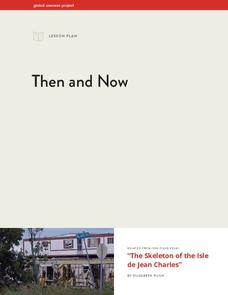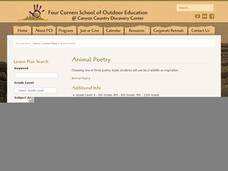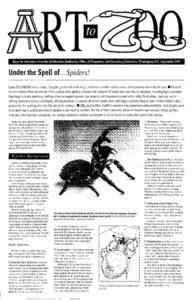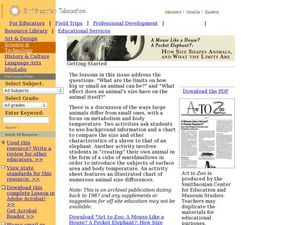Global Oneness Project
Then and Now
The devastating changes happening to the Native American inhabitants of an island off the coast of Louisiana are the topic of an informational lesson. After scholars break into groups to explore particular topics, they come back together...
Howard Hughes Medical Institute
The Making of the Fittest: Got Lactase? The Co-evolution of Genes and Culture
Got milk? Only two cultures have had it long enough to develop the tolerance of lactose as an adult. Learn how the responsible genes evolved along with the cultures that have been consuming milk. This rich film is supplied with a few...
Howard Hughes Medical Institute
Got Lactase? The Co-Evolution of Genes and Culture
Does the human body evolve as quickly as human culture? With a stellar 15-minute video, explore the trait of lactose intolerance. Only about 1/3 of human adults seem to still have the enzyme lactase and therefore, the ability to digest...
Curated OER
Mayan Farming Practices
The introduction of this lesson requires reading a from The Maya by Jaqueline Dembar Greene. Learners sketch a Mayan during the reading. Teaching strategies include direct instruction, grouping the students for discussions, reasearch,...
Curated OER
Native American Three Sisters Gardens
Students investigate companion planting. In this communtiy gardening instructional activity students explore the tradition of the Native American Three Sisters gardening approach. Students act as botanists, anthropologists, folklorists,...
California Academy of Science
Human Evolution
As the great and hilarious Tim Minchin once said, "Science is simply the word we use to describe a method of organizing our curiosity." Science is more than just a guess; it is based on questions, observations, and evidence. High...
Curated OER
Human Evolution: Biology, Bones
Learners will love a weeks worth of bone study. They use bones and characteristics of bones to explore the evolution of hominoids. Bones are compared, categorized, and considered. A great way to bring physical anthropology and material...
Curated OER
Great Rivers 2: The Ups and Downs of River Flooding
Second in a three-part lesson on rivers, this lesson focuses on the flooding that occurs in riparian locations. First, learners take a look at facts about the Amazon River. They read online materials and fill in a worksheet as they...
Curated OER
Urban Ecosystems 2: Why are There Cities? A Historical Perspective
Second in a series of five lessons, this lesson encourages preteens to consider cities as urban ecosystems. First, they keep a food diary for a few days. They visit the Natrional Agricultural Statistics Service website for current data...
Curated OER
Urban Ecosystems 4: Metabolism of Urban Ecosystems
Cities are compared to living, breathing, metabolizing organisms. Fourth in a five-part series of lessons, this one focuses on the flow of materials through a city. Links to interesting websites and images make your delivery of...
Curated OER
Animal Poetry
Fourth graders write poems that use local wildlife as their inspiration. After a class discussion which produces a list of wildlife that pupils have seen in their town, a review of three types of poetry ensues. They look at how haiku,...
Curated OER
Human Origins: The Prehistoric Human Race
When it comes to the origin of the human species students are full of misconceptions. Clear up the hominid confusion with this evolutionary activity focused on assisting students in understanding prehistoric man and his family tree....
Curated OER
Indians in Georgia: How Do We Know What We Know?
Students discover archaeology by investigating the history of Native Americans in Georgia. In this U.S. history lesson, students participate in a mock archaeological excavation in their classroom by recovering artifacts and drawings...
American Museum of Natural History
Einstein in Time
Einstein sure had an interesting life. Using a remote learning resource, pupils examine a timeline of Einstein's life. They learn about the major scientific discoveries as well as humanitarian and social work. Additionally, they read...
Curated OER
Exploring Explorations-Ocean Exploration
Students learn about Earth's deep ocean discoveries and their benefits. In this ocean exploration lesson, students review previous explorations of the Earth's deep oceans and learn about the discoveries of the past.
Curated OER
Stopping Deforestation in the Amazon: A Publicity Campaign
Students investigate the environment by designing a group project. In this ecology lesson, students identify the man made threats to the Amazon while reading environmentally conscience vocabulary terms. Students collaborate in groups...
Smithsonian Institution
Watching Crystals Grow
Amazing science can sometimes happen right before your eyes! The class gets cozy as they watch crystals grow. They use Epsom salts, rocks, and food coloring to create crystals. They'll observe the entire process, documenting every step...
Curated OER
Life Along the Ring of Fire
Students research geological forces that create the Ring of Fire and its effects on cultures. They write reports on how natural disasters influence societies.
Curated OER
Going...going...gone? Tropical Rainforests-How They Work, What They Do for Us, What's Being Done to Them...
Sixth graders explore the Tropical Rainforest and come to understand what it is and how it affects the ecosystem. In this rainforests lesson, 6th graders write about the Tropical Rainforest, imagine they are in the Tropical Rainforest,...
Curated OER
"ART ZOO 'Blacks in the Westward Movement', 'What Can You Do with a Portrait', and 'Of Beetles, Worms, and Leaves of Grass'"
Students study black history, examine portraits and portrait making and create their own portraits, and investigate their natural environment. This humanities lesson provides a text that can be used to teach lessons in black history,...
Curated OER
Under the Spell of Spiders
Learners examine spiders. In these spider lessons, students will view spider images and live spiders to determine physical characteristics, habits, and habitats. Learners will examine fantasy and folklore about spiders to create and...
Curated OER
How Size Shapes Animals
Students investigate how size affects large and small animals differently. In this animal lesson plan, students determine how size affects different animals by constructing their own animal out of marshmallows. Once students create...
Curated OER
Fossils Footprints Across Time
Learners examine fossils to understand how they are formed and how they give information about geological history. In this fossil instructional activity, students research and write about fossils and make models of different fossil...
Curated OER
Archaeology: Digging in the Classroom
Students explore how an archaeologist works and makes discoveries. In this archaeology lesson, students participate in a simulation in which they excavate broken pottery. Students use measurement, geometry, and observation skills during...

























